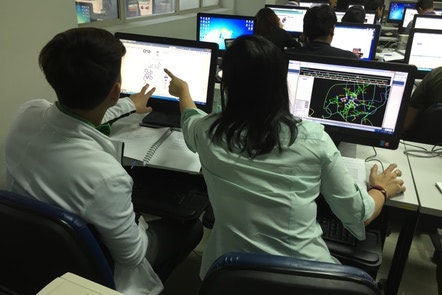New online course launched to help doctors and nurses better understand how genomics can battle bacterial diseases

Wellcome Genome Campus Advanced Courses and Scientific Conferences (ACSC) today announces the launch of its first online course, in partnership with FutureLearn, the leading social learning platform.
The new partnership will present a free online course introducing the genomics of disease-causing bacteria, such as MRSA, E. coli and Chlamydia which infect millions of people every year.
The course, ‘Bacterial Genomes: Disease Outbreaks and Antimicrobial Resistance’ was developed in collaboration with the Wellcome Sanger Institute and the University of Cambridge.
Designed to educate healthcare professionals and biologists worldwide on how the genomes of bacteria can be used to understand, and identify and track bacterial diseases and antibiotic resistance, this is the first of a series of 10 online courses.
The course is free and is open for enrolment now, with the course starting on April 30th 2018.
This 3-week introduction to pathogen genomics will be the first online course offered by ACSC and is open to anyone to join.
As part of the Wellcome mission to be as accessible as possible worldwide, ACSC has sponsored this open access course to provide free enrolment and free certification.
The course will take approximately 3 hours study time per week and learners can complete at their own pace.
Humans have been plagued by bacterial diseases throughout history. For example, the bacteria which causes tuberculosis (TB) killed 1.3 million people across the world last year, mainly in developing countries.
These bacterial diseases are made more dangerous by the rise of antibiotic resistance, which is one of the greatest threats to human health worldwide.
Especially important for people who work in healthcare, the course will teach participants how sequencing the DNA of bacteria offers an unprecedented opportunity to understand bacterial diseases, their spread and their resistance to drugs.
Dr Estee Torok, honorary consultant physician at Addenbrooke’s hospital and researcher at the University of Cambridge, who is featured in the course, said. “There is a gap in the understanding of pathogen genomics amongst healthcare professionals in the NHS and abroad, despite the importance of genomics in tracking the spread of bacterial diseases and antibiotic resistance. This innovative, free three-week course is a great way for our medical and nursing colleagues to get up to speed on this quickly.”
Dr Rebecca Twells, Head of ACSC said: “With our long history and expertise in running face- to- face postgraduate courses and conferences, we are delighted to partner with FutureLearn to run our first online course. Developed and presented in collaboration with Dr Adam Reid and Dr Francesca Short from the Wellcome Sanger Institute and Dr Josie Bryant from the University of Cambridge, this free course will enable thousands of people both here in the UK and abroad to learn about the genetics of pathogenic bacteria. This paves the way for the further courses in the series.”
Dr Adam Reid, senior staff scientist at the Wellcome Sanger Institute who co-designed the course, said: “Thanks to scientific advances we have powerful tools like antibiotics to combat devastating bacterial diseases such as cholera and TB. However, outbreaks continue to happen and genomic science is a vital new weapon against them. We have specifically designed this course with ACSC to help people understand how genomics can be used to fight these bacterial pathogens.”
Helen Fuller, Healthcare lead at FutureLearn, said: “It’s fantastic to be able to collaborate with the Wellcome Genome Campus to showcase the work they’re doing in this space and share this with a global community of learners. We’re thrilled to be able to support healthcare practitioners and scientists in this way; the opportunities enabled by an online learning experience will expose learners to insights from like-minded professionals worldwide, which will better inform their practice and cement their understanding of such a complex, yet fascinating topic.”











Responses